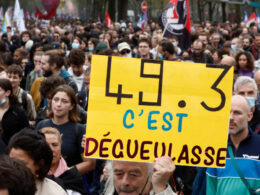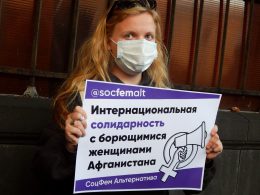Hundreds of thousands of public sector workers took to the streets of Athens and others cities across Greece during the 24 hours public sector strike called by the public sector union federation ADEDY. The strike was very successful as more than 85% of public sector workers participated, closing down all public services from the airports to the schools. This strike should signal only be the beginning of further struggle against the vicious attacks on workers’ salaries and pensions. The 11 February strike was an answer to PASOK [Greece’s version of New Labour currently in government] government policies and EU pressure to make workers will pay for the economic crisis.
Greek governments have attempted to hide the scale and depth of the economic crisis in Greece – their lies have been exposed and the magnitude of the crisis is now impacting on the stability of the euro.
Yet, the reality remains that the deep recession in combination with the huge public deficit, 12.7% of the GNP (about €30.5 billion) will mean further cutbacks and increased taxation for the working class.
PASOK that condemned the previous government (New Democracy- conservative party in government until October 2009) about their privatisation policies and severe attacks on pensions and the retirement age, are now contemplating putting forward the same measures.
Prime Minister George Papandreou, is using the public deficit as an excuse and the pressure he is under from the big countries in the European Union to justify introducing these anti-working class measures.
And the first ones they are targeting are public sector workers whose salaries have been frozen and allowances cut by 10% – which amounts to a 5% wage cut as allowances are an essential part of salaries. Spending on public services is also being cut by 10%.
When ADEDY called the 24 hour public sector strike, the leadership of the GSEE the private sector union federation controlled by PASOK refused to participate. However the severity of the measures taken by the PASOK government has caused such dismay and a reaction amongst the working class that the leadership of GSEE has been forced to call a strike of private sector workers for the 24 February. The public sector unions have also called a strike for the same day which means that a 24 hour general strike will take place on 24 February.
The financial situation in Greece has made all the European governments deeply worried, as it has caused the euro to drop dramatically in the last few weeks and everybody is afraid that it might have a domino effect on other countries’ fragile economies.
So, for the first time in years the public sector strike was covered by most European media. And amidst all this, France and Germany who until now have presented themselves as unbending as far as bailing out Greece is concerned had to give in, fearing that their economies will be gravely affected. Going against the “Stability Pact” that European governments had signed according to which no member state can lend money directly to another, they are now willing to act as guarantors so that the Greek state can borrow money again.
The Greek working class has shown in the past that they know how to fight, once again more general strikes will need to be organised, both 24-hour strikes and 48 hour to defeat the government’s attack on public sector workers pay and services.
Click on the link below for the article
EU ‘rescue’ comes with ruthless “stringent conditions – workers’ mass resistance must continue! By Andreas Payiatsos, Xekinima (CWI Greece), Athens
http://www.socialistworld.net/z/bin/pf/pf.cgi?url=%2Feng%2F2010%2F02%2F1201.html












